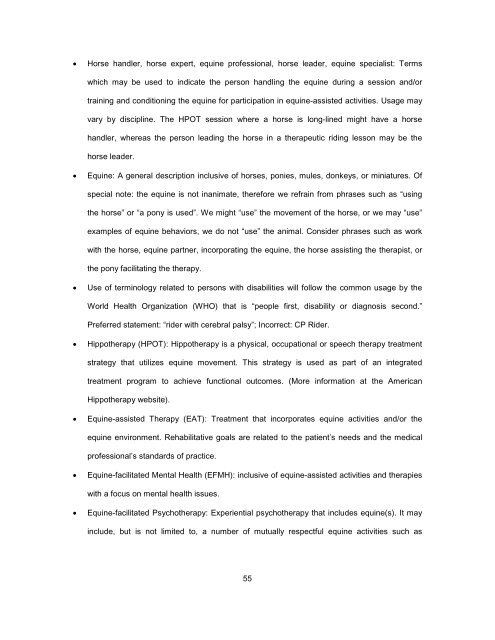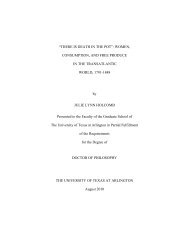A SYSTEMATIC REVIEW OF THE EFFECTS OF PSYCHOTHERAPY ...
A SYSTEMATIC REVIEW OF THE EFFECTS OF PSYCHOTHERAPY ...
A SYSTEMATIC REVIEW OF THE EFFECTS OF PSYCHOTHERAPY ...
Create successful ePaper yourself
Turn your PDF publications into a flip-book with our unique Google optimized e-Paper software.
• Horse handler, horse expert, equine professional, horse leader, equine specialist: Terms<br />
which may be used to indicate the person handling the equine during a session and/or<br />
training and conditioning the equine for participation in equine-assisted activities. Usage may<br />
vary by discipline. The HPOT session where a horse is long-lined might have a horse<br />
handler, whereas the person leading the horse in a therapeutic riding lesson may be the<br />
horse leader.<br />
• Equine: A general description inclusive of horses, ponies, mules, donkeys, or miniatures. Of<br />
special note: the equine is not inanimate, therefore we refrain from phrases such as “using<br />
the horse” or “a pony is used”. We might “use” the movement of the horse, or we may “use”<br />
examples of equine behaviors, we do not “use” the animal. Consider phrases such as work<br />
with the horse, equine partner, incorporating the equine, the horse assisting the therapist, or<br />
the pony facilitating the therapy.<br />
• Use of terminology related to persons with disabilities will follow the common usage by the<br />
World Health Organization (WHO) that is “people first, disability or diagnosis second.”<br />
Preferred statement: “rider with cerebral palsy”; Incorrect: CP Rider.<br />
• Hippotherapy (HPOT): Hippotherapy is a physical, occupational or speech therapy treatment<br />
strategy that utilizes equine movement. This strategy is used as part of an integrated<br />
treatment program to achieve functional outcomes. (More information at the American<br />
Hippotherapy website).<br />
• Equine-assisted Therapy (EAT): Treatment that incorporates equine activities and/or the<br />
equine environment. Rehabilitative goals are related to the patient’s needs and the medical<br />
professional’s standards of practice.<br />
• Equine-facilitated Mental Health (EFMH): inclusive of equine-assisted activities and therapies<br />
with a focus on mental health issues.<br />
• Equine-facilitated Psychotherapy: Experiential psychotherapy that includes equine(s). It may<br />
include, but is not limited to, a number of mutually respectful equine activities such as<br />
55
















